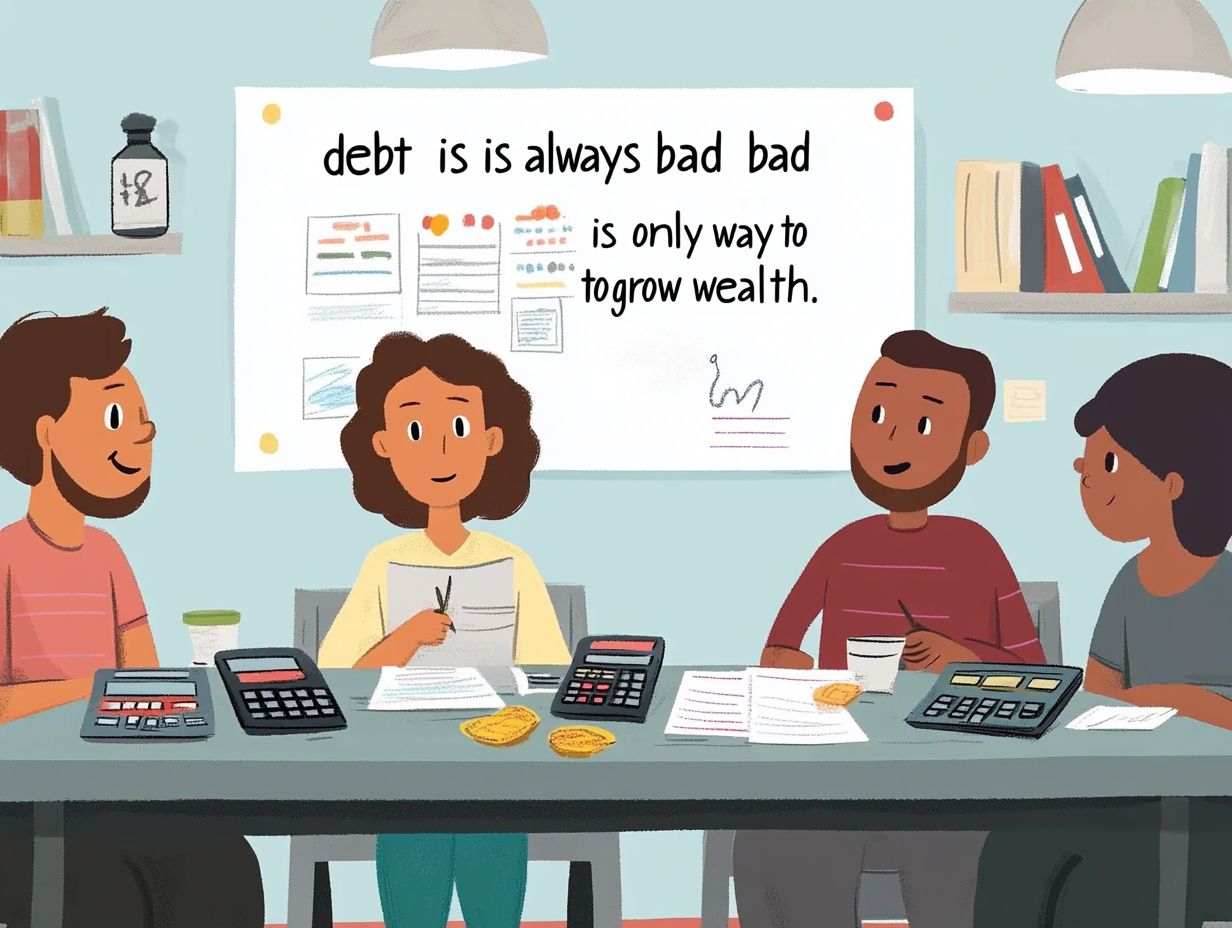10 Common Misconceptions About Personal Finance?
Managing your personal finances can often feel like navigating a complex maze, especially with the barrage of conflicting advice out there.
It’s easy to fall prey to misconceptions that can sabotage your financial health and keep you from reaching your goals. Let s tackle ten myths that might be holding you back from financial freedom ranging from the outdated belief that you need to be wealthy to manage your money effectively to the misguided notion that saving for emergencies is an unattainable dream.
By debunking these myths, we aim to empower you with practical tips and insights that will enable you to take charge of your financial well-being. Dive into the essential principles of personal finance and discover the actionable steps you can take to forge a more secure financial future.
Contents
- Key Takeaways:
- 1. You Need to Be Rich to Manage Your Finances
- 2. Budgeting Means You Can’t Have Fun
- 3. Credit Cards Are Always Bad
- 4. Financial Advisors Are Only for the Wealthy
- 5. You Can’t Save Money If You Have Debt
- 6. Investing Is Only for the Stock Market
- 7. You Don’t Need to Save for Retirement Until You’re Older
- 8. Paying Off Debt Should Always Be the Top Priority
- 9. You Can’t Afford to Save for Emergencies
- 10. You Can’t Improve Your Credit Score
- What Is Personal Finance and Why Is It Important?
- Frequently Asked Questions
Key Takeaways:
- Personal finance is for everyone, not just the wealthy. It’s important to start managing your money regardless of your income level.
- Budgeting doesn’t mean sacrificing fun. It’s about prioritizing your spending and finding ways to save without sacrificing enjoyment.
- Credit cards can be useful if used responsibly, but they should not be relied on for daily expenses or to make unnecessary purchases.
1. You Need to Be Rich to Manage Your Finances
The common belief that you must be wealthy to manage your personal finances effectively is a significant myth. This misconception diminishes the importance of financial planning and sound money management for individuals from all economic backgrounds.
This myth often leads to unnecessary spending and poor saving habits. It can worsen economic struggles, particularly for those already grappling with consumer debt.
Understanding how to manage money is a powerful tool for anyone seeking to take charge of their financial future, no matter their current income level. By mastering the art of creating an effective budget, you can prioritize your spending and identify opportunities to set aside funds for savings.
Knowing the difference between needs and wants enables you to make smarter purchasing decisions. This essential knowledge forms the foundation for cultivating healthier financial habits.
Even those on modest incomes can gradually build a financial cushion. The ability to manage finances effectively isn t exclusive to the wealthy; it s a skill that can enhance the economic well-being of everyone.
2. Budgeting Means You Can’t Have Fun
The misconception that budgeting means deprivation is harmful and can seriously impede your financial planning.
In truth, budgeting is an enabling tool that paves the way to financial freedom. It allows you to allocate funds for both necessities and personal pleasures.
By thoughtfully planning where your money goes, you can indulge in experiences that bring you joy, all while sidestepping the stress of overspending.
Incorporating enjoyable expenses like dining out, vacations, or hobbies into your budget can actually boost your motivation to save more. By developing savings strategies that prioritize enjoyment, you can maintain a fulfilling lifestyle.
This shows that living well and achieving your financial goals can coexist beautifully.
3. Credit Cards Are Always Bad
Credit cards often get a bad rap. However, when used wisely, they can be invaluable allies in building a positive credit score.
By earning rewards on everyday purchases, you open the door to cashback, travel perks, or discounts that can save you money over time. It s essential to grasp the nuances of high-interest debt.
Overspending can lead to financial pitfalls, but by utilizing budgeting tools, you can take control of your spending habits. This approach helps you maintain a balanced financial life.
When used smartly, credit cards can significantly enhance your financial stability and serve as a safety net during emergencies.
4. Financial Advisors Are Only for the Wealthy
The notion that financial advisors only serve the wealthy is a common misunderstanding. This belief may keep you from seeking the valuable guidance you deserve in personal finance especially during tough economic times when solid advice is essential.
In truth, help with money management comes in various tiers. This ensures that individuals across different income levels can find support for budgeting, investment strategies, and wealth management. Many advisors offer customized packages specifically designed for middle-income earners. These packages equip you with vital tools to tackle financial challenges and build a secure future.
Whether you re interested in crafting a robust savings plan or making savvy investment decisions, professional advice can significantly enhance your financial journey. This reinforces the important idea that sound financial practices are accessible to everyone, not just the affluent.
5. You Can’t Save Money If You Have Debt
Many people think that accumulating debt means you can’t save money. However, with the right debt management strategies and a bit of financial discipline, it’s absolutely possible to create a solid emergency fund while juggling your existing obligations.
You can strike a balance between repaying debt and saving by prioritizing your financial activities. Making at least the minimum payments on your debts is essential; it helps prevent further interest from piling up and avoids penalties. This approach creates room for both responsibilities and future savings.
Crafting a comprehensive financial plan means evaluating your monthly income and expenses. Find areas to cut costs and set aside a portion of your budget for savings. By setting realistic goals, you can build your savings while systematically tackling your debt. This ensures a balance that nurtures financial security.
6. Investing Is Only for the Stock Market

The myth that investing is confined to the stock market overlooks the wealth of opportunities available for building your fortune, including real estate, bonds, and alternative investments. Exploring these diverse avenues right now can broaden your portfolio and help mitigate the risks linked with market volatility.
Take real estate, for example; it often delivers a steady income stream and the potential for appreciation. Meanwhile, mutual funds can provide varying levels of risk, catering to different investment styles and preferences.
This is where financial literacy comes into play. Understanding these opportunities allows you to make informed decisions about where to allocate your resources. By enhancing your knowledge, you can craft a personalized investment strategy that aligns with your financial goals and risk tolerance. This ultimately paves the way for sustainable wealth creation.
7. You Don’t Need to Save for Retirement Until You’re Older
Delaying your retirement savings until later in life is a common misstep. However, proactive financial planning and consistent contributions to your retirement accounts can greatly enhance your future financial stability.
By harnessing the remarkable power of compound interest the interest on your savings that grows bigger over time you can watch your savings grow exponentially. Starting to save early gives your investments the necessary time to generate earnings on both the principal and the accumulated interest, creating a snowball effect that can lead to a substantial nest egg.
Consider various retirement accounts, such as:
- 401(k)s
- IRAs
- Roth IRAs
Each of these comes with unique tax advantages and growth potential. To maximize these benefits, adopt effective strategies like automated contributions and regularly reassessing your investment choices.
These steps can help you build a robust retirement fund. Start planning for your retirement today to ensure a comfortable financial future.
8. Paying Off Debt Should Always Be the Top Priority
While managing debt is undeniably important, prioritizing it over all other financial goals can sometimes inhibit your overall financial health.
It s essential to strike a balance between debt repayment and saving. This balance becomes crucial when you consider factors like credit utilization, which is the amount of credit you are using compared to your total credit limit and plays a significant role in determining your credit score.
High credit utilization negatively impacts your ability to secure loans or obtain favorable interest rates in the future.
Establishing an emergency fund acts as your financial safety net, helping you avoid reliance on credit cards during unexpected expenses.
By ensuring you allocate funds for both responsible debt management and savings, you can enhance your financial stability, paving the way for better outcomes down the road.
9. You Can’t Afford to Save for Emergencies
The notion that you can’t afford to set aside funds for an emergency fund is a misconception that can lead to long-term financial instability and increased dependence on credit during tough times.
In reality, even small, consistent contributions to a savings account can add up, creating a safety net for unexpected expenses like medical bills or car repairs.
Many financial experts suggest starting with as little as $20 a week, an amount that can easily fit into your monthly budget.
By utilizing budgeting tools whether that’s an app that tracks your spending or a simple spreadsheet to categorize expenses you can gain clarity on your financial situation and pinpoint areas where you can cut back.
Start saving today! Every dollar counts toward your safety net. By prioritizing these contributions, you can quickly build a financial cushion that will give you peace of mind and alleviate the stress that comes with financial emergencies.
10. You Can’t Improve Your Credit Score
The idea that improving your credit score is an unattainable dream is simply a misconception. With the right financial knowledge and disciplined debt management, you can take concrete steps to enhance your creditworthiness.
Prioritize timely payments this is essential because payment history is a key factor in credit assessments. Managing your credit utilization keeping those balances low relative to your credit limits can further bolster your credit health.
Make it a habit to check your credit reports regularly from credit reporting agencies, which are crucial in tracking and evaluating your credit behavior. Understanding these reports can provide you with valuable insights into areas that require attention, ultimately guiding your efforts to strengthen your financial standing over time.
What Is Personal Finance and Why Is It Important?
Personal finance is all about managing your money, from budgeting and saving to investing and planning for the future. This skill set is essential for navigating economic challenges and achieving long-term financial stability.
When you grasp key components like income management and expenditure tracking, you can make informed decisions that improve your financial health and foster a sense of security and peace of mind.
Financial planning enables you to set realistic goals and carve out pathways to achieve them. Effective budgeting helps you prioritize essential spending and pinpoint areas where you can save.
By adopting sound money management practices, you can minimize debt and seize investment opportunities, ultimately enhancing your quality of life, reducing stress, and boosting your confidence in tackling unexpected financial hurdles.
What Are the Basic Principles of Personal Finance?

Personal finance starts with understanding money management. Learn budgeting, saving, and debt management to secure your financial future.
By becoming proficient in these foundational elements, you enable yourself to make informed financial decisions and establish a safety net for unexpected expenses. Living within your means, prioritizing essential expenditures over fleeting luxuries, and consistently setting aside a portion of your income for savings are crucial steps in cultivating financial stability.
It’s vital to grasp the distinctions between good and bad debt; this knowledge equips you to make strategic borrowing choices. Regularly reviewing your personal finances and using budgeting tools can enhance your understanding of cash flow, which is how money moves in and out of your accounts. Additionally, being aware of common personal finance mistakes to avoid paves the way for a comprehensive approach to achieving financial health.
How Can Personal Finance Impact Your Overall Well-Being?
Managing your finances well is key to your well-being. It helps you handle economic challenges and build wealth through informed financial decisions.
By establishing a solid budget, you create a cushion that absorbs unexpected expenses, significantly reducing your overall stress levels. When you know where you stand financially, it fosters a sense of control and enablement, allowing you to make thoughtful choices instead of succumbing to impulsive reactions.
Over time, these prudent financial practices not only enhance your quality of life but also build resilience against potential financial setbacks. This strategic approach paves the way for long-term stability, enabling you to invest in experiences and opportunities that enrich your life and promote lasting happiness.
What Are the Most Common Financial Mistakes People Make?
Common mistakes like ignoring your budget or not saving enough hurt your financial health and overall stability.
These errors can lead to stress, unexpected expenses, and hinder your ability to achieve long-term financial goals, like homeownership or securing a comfortable retirement. For instance, without a solid budget in place, you might find yourself overspending and racking up debt, which often results in late fees and sky-high interest charges.
To counteract these challenges, establishing a realistic budget and sticking to it can help you manage your expenses more effectively. Implementing an automatic savings plan ensures that a portion of your income is consistently set aside, while leveraging financial education resources will provide you with the insights needed for responsible borrowing to keep debt under control.
How Can You Start Taking Control of Your Finances?
Start taking control of your finances by managing your money proactively. Create budgets, set savings goals, and look into investment options tailored to your needs.
Your journey begins with a thorough assessment of your current financial standing. This involves evaluating your income, expenses, and any existing debts. Using budgeting tools can streamline this process, enabling you to visualize your spending habits and pinpoint areas where you can improve, while avoiding the top 10 budgeting mistakes.
Once you’ve got a clear picture, setting realistic financial goals both short-term and long-term will keep you focused and motivated. As your confidence in financial decisions grows, you’ll find it beneficial to explore a variety of investment opportunities. Whether you gravitate towards stocks, bonds, or mutual funds, diversifying your investments will enhance your financial stability for the long haul.
What Are Some Practical Tips for Managing Personal Finances?
Manage your personal finances with practical tips. Start by crafting a realistic budget and using effective saving strategies.
Track your expenses carefully. This helps you find unnecessary spending and redirect that money into savings or debt repayment.
Setting up automatic savings transfers ensures a portion of your income builds an emergency fund or saves for future goals. This can greatly reduce financial stress.
Prioritize debt repayment to cut down on interest payments. It also helps you develop a disciplined approach to your finances.
These strategies foster a sense of financial empowerment. Start today for a stable and secure future!
Frequently Asked Questions
What is personal finance?

Personal finance is the management of an individual’s financial resources, such as income, expenses, investments, and savings.
What are the 10 common misconceptions about personal finance?
The 10 common misconceptions about personal finance are:
- Personal finance is only for the rich.
- Investing is only for experts.
- You need a lot of money to start investing.
- Credit cards are always bad for your finances.
- Saving money means sacrificing your lifestyle.
- You have to be debt-free to start investing.
- Renting is throwing away money.
- Financial planning is only for retirement.
- Budgeting is too time-consuming.
- Your income determines your financial stability.
Is personal finance just about budgeting?
No, personal finance involves much more than just budgeting. It also includes managing debt, investing, planning for retirement, and making financial decisions that align with your goals and values.
Can anyone learn about personal finance?
Yes, anyone can learn about personal finance. It doesn’t require any specific qualifications or background. With the abundance of resources available, anyone can improve their financial knowledge and skills.
Do I need a financial advisor to manage my personal finances?
While a financial advisor can offer valuable advice and guidance, it is not necessary to have one to manage your personal finances. With the right resources and knowledge, anyone can handle their own finances effectively.
Is it too late to start managing my personal finances?
No, it is never too late to start managing your personal finances. It’s important to take control of your finances at any stage of life to improve your financial stability and future.
Ready to take charge of your finances? Start implementing these tips today!






